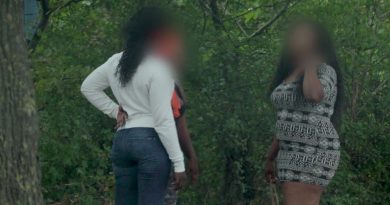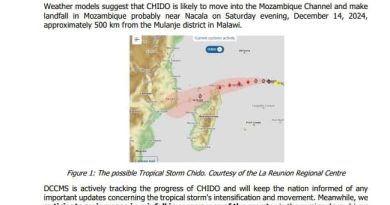The ‘big three’ can make a difference
Peace, as they say, is a prerequisite for development. In war-torn zones of the continent such as the Democratic Republic of Congo, Somalia, South Sudan and in the Maghreb region, people are butchering each other for differences in politics and religion among other reasons. It is not worth it. Differences in political and religious belief calls for coexistence; it is what democracy entails.
For years, Malawi as a country has been touted for peace and tranquility. The first and founding president of Malawi, Ngwazi Dr Hastings Kamuzu Banda was known for his contact and dialogue policy throughout Africa and beyond. It’s what knitted us together as a people. Unfortunately, that togetherness is under threat due to different political ideologies and a breakdown in the rule of law.
Prior to the Tripartite Elections on May 21 last year, there were reports of political violence in some parts of the country. Some political parties and their overzealous supporters, exuding political intolerance, beat up their political opponents declaring certain parts of the country, their ‘home’ where no other political party should dare hold campaign rallies.

Some video clips of such intolerance went viral on social media – with one showing a woman being undressed by supporters of a certain party in Mangochi in the Eastern Region. The act was condemned and later police arrested the suspects. Such violence was an indication that after May 21 the situation would turn uglier. It did.
Today, Malawi is a country that has been thrown into anarchy. From primary school pupils to loafers in streets, demonstrations have become the solution to sort out every single problem. A few days ago, when teachers protested for getting their December salaries late, some pupils in some districts went wild and destroyed properties.
They were angry because their teachers abandoned classes. The teachers’ condition was that they would only go back to class after getting their salaries. The police officers who were alerted of the actions of the irate pupils were helpless. How would they deal with minors without getting the wrath of human rights organisations that jump at every opportunity to condemn any perceived form of violence?
The human rights organisations themselves have been demonstrating for the past nine months leaving a trail of destruction in their wake. For instance, the organisers of demonstrations, have refused to take responsibility for the looted property and loss of life each time such a situation arises.
They put the blame on the police officers failing to control the crowd. Police officers also put the blame on the organisers and at the end of the day businesses have been looted and destroyed. In some instances, people have lost lives. We still ask, who will take the blame for all this violence and anarchy?
The ‘big three’ can do something
The results of the May 21 presidential poll put President Peter Mutharika of the Democratic Progressive winner with 38.57 percent of the vote. Malawi Congress Party candidate Dr Lazarus Chakwera was second while UTM Party leader Dr Saulos Chilima came third. The opposition was not satisfied with the way the Malawi Electoral Commission managed vote counting. Dr Chilima and Dr Chakwera went to court to seek justice. They want fresh elections.
Efforts by the quasi-religious body, the Public Affairs Committee (PAC) to bring the three leaders to a round table for discussions have not been fruitful. Up to this day the three leaders are not willing to talk. They say they are waiting for the Constitutional Court’s decision on the matter. The supporters of the three leaders have been involved in scuffles along the way. The messages from the three leaders chastising their supporters have been somewhat muffled. They have not been inspiring. These leaders need to do more. It should not be just about themselves and their families; this is a matter of nation-building.
This is why we find it very important for the three to reason and go beyond party interests. They have a responsibility and an obligation to condemn the violence in some parts of this country. These leaders have been on a collision course for nine months and the results have been very devastating. They need to hang gloves and embrace peace. It is possible to share an olive branch and put Malawi on a path to prosperity and development.
Both losers and winners in this electoral battle are brothers and sisters; they are all Malawians – some are neighbours. And the word says love thy neighbour. Professor Mutharika, Dr Chakwera and Dr Chilima can help to change the way we practice politics in this country. They are all well learned; they are God-fearing and they love their country. Why then should they show indifference when the people they want to lead hack and butcher each other in the name of supporting the three leaders?
Another sad development is how deep seated corruption has become in Malawi. Apart from the mother of all corrutption scandals – Cashgate – we hear of how millions of state funds are abused by politicians, civil servants and businesspersons.
Recently, we also heard of how some people wanted to bribe judges hearing the election case. This is sad. The development may further deepen the mistrust that people have in certain governance institutions, including the courts. We hope relevant authorities will investigate this issue with the urgency that it requires.
Those in authority have a moral obligation to root out corruption and embark on a campaign to civic educate everyone on the dangers of corruption. Corruption is a cancer sweeping across our beloved country. We must cure it.
Conclusion
One leader in this country said “We don’t eat politics”. He had observed how some people attach themselves to politics; how, instead of tilling the land and produce food, they go about following politicians and ask for handouts. Politics should not derail people from helping Malawians to rebuild the economy, so that the benefits a producing and exporting country should trickle down to millions of families that are struggling to put body and soul together.
It is possible to care for the environment and help Malawi save millions of Kwachas that are being spent on effects of environmental degradation. Such expenditures could go toward building schools and better hospitals that have drugs in stock.
Caring for the environment has so many benefits such as uninterrupted electricity supply, reliable rainfall and clean water. The three leaders can pass on this message to their followers at their political rallies instead of churning out mediocrity and triviality.
Malawians’ profound hope is that the country would remain peaceful even after the Constitutional Court ruling. There can only be one winner in this case. At the end of the day, Malawians need sit down and reflect on the way they practice politics. Is it worth it fighting each other? Is it sensible burning down police stations, government offices and businesses? The future of this nation is in our hands. Nobody wants to create another war zone in Africa.



4 thoughts on “The ‘big three’ can make a difference”